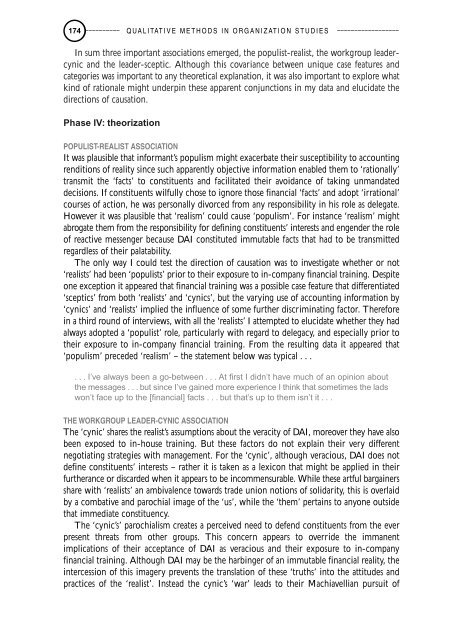essential-guide-to-qualitative-in-organizational-research
essential-guide-to-qualitative-in-organizational-research
essential-guide-to-qualitative-in-organizational-research
- No tags were found...
You also want an ePaper? Increase the reach of your titles
YUMPU automatically turns print PDFs into web optimized ePapers that Google loves.
174 –––––––––– QUALITATIVE METHODS IN ORGANIZATION STUDIES ––––––––––––––––––In sum three important associations emerged, the populist-realist, the workgroup leadercynicand the leader-sceptic. Although this covariance between unique case features andcategories was important <strong>to</strong> any theoretical explanation, it was also important <strong>to</strong> explore whatk<strong>in</strong>d of rationale might underp<strong>in</strong> these apparent conjunctions <strong>in</strong> my data and elucidate thedirections of causation.Phase IV: theorizationPOPULIST-REALIST ASSOCIATIONIt was plausible that <strong>in</strong>formant’s populism might exacerbate their susceptibility <strong>to</strong> account<strong>in</strong>grenditions of reality s<strong>in</strong>ce such apparently objective <strong>in</strong>formation enabled them <strong>to</strong> ‘rationally’transmit the ‘facts’ <strong>to</strong> constituents and facilitated their avoidance of tak<strong>in</strong>g unmandateddecisions. If constituents wilfully chose <strong>to</strong> ignore those f<strong>in</strong>ancial ‘facts’ and adopt ‘irrational’courses of action, he was personally divorced from any responsibility <strong>in</strong> his role as delegate.However it was plausible that ‘realism’ could cause ‘populism’. For <strong>in</strong>stance ‘realism’ mightabrogate them from the responsibility for def<strong>in</strong><strong>in</strong>g constituents’ <strong>in</strong>terests and engender the roleof reactive messenger because DAI constituted immutable facts that had <strong>to</strong> be transmittedregardless of their palatability.The only way I could test the direction of causation was <strong>to</strong> <strong>in</strong>vestigate whether or not‘realists’ had been ‘populists’ prior <strong>to</strong> their exposure <strong>to</strong> <strong>in</strong>-company f<strong>in</strong>ancial tra<strong>in</strong><strong>in</strong>g. Despiteone exception it appeared that f<strong>in</strong>ancial tra<strong>in</strong><strong>in</strong>g was a possible case feature that differentiated‘sceptics’ from both ‘realists’ and ‘cynics’, but the vary<strong>in</strong>g use of account<strong>in</strong>g <strong>in</strong>formation by‘cynics’ and ‘realists’ implied the <strong>in</strong>fluence of some further discrim<strong>in</strong>at<strong>in</strong>g fac<strong>to</strong>r. Therefore<strong>in</strong> a third round of <strong>in</strong>terviews, with all the ‘realists’ I attempted <strong>to</strong> elucidate whether they hadalways adopted a ‘populist’ role, particularly with regard <strong>to</strong> delegacy, and especially prior <strong>to</strong>their exposure <strong>to</strong> <strong>in</strong>-company f<strong>in</strong>ancial tra<strong>in</strong><strong>in</strong>g. From the result<strong>in</strong>g data it appeared that‘populism’ preceded ‘realism’ – the statement below was typical . . .. . . I’ve always been a go-between . . . At first I didn’t have much of an op<strong>in</strong>ion aboutthe messages . . . but s<strong>in</strong>ce I’ve ga<strong>in</strong>ed more experience I th<strong>in</strong>k that sometimes the ladswon’t face up <strong>to</strong> the [f<strong>in</strong>ancial] facts . . . but that’s up <strong>to</strong> them isn’t it . . .THE WORKGROUP LEADER-CYNIC ASSOCIATIONThe ‘cynic’ shares the realist’s assumptions about the veracity of DAI, moreover they have alsobeen exposed <strong>to</strong> <strong>in</strong>-house tra<strong>in</strong><strong>in</strong>g. But these fac<strong>to</strong>rs do not expla<strong>in</strong> their very differentnegotiat<strong>in</strong>g strategies with management. For the ‘cynic’, although veracious, DAI does notdef<strong>in</strong>e constituents’ <strong>in</strong>terests – rather it is taken as a lexicon that might be applied <strong>in</strong> theirfurtherance or discarded when it appears <strong>to</strong> be <strong>in</strong>commensurable. While these artful barga<strong>in</strong>ersshare with ‘realists’ an ambivalence <strong>to</strong>wards trade union notions of solidarity, this is overlaidby a combative and parochial image of the ‘us’, while the ‘them’ perta<strong>in</strong>s <strong>to</strong> anyone outsidethat immediate constituency.The ‘cynic’s’ parochialism creates a perceived need <strong>to</strong> defend constituents from the everpresent threats from other groups. This concern appears <strong>to</strong> override the immanentimplications of their acceptance of DAI as veracious and their exposure <strong>to</strong> <strong>in</strong>-companyf<strong>in</strong>ancial tra<strong>in</strong><strong>in</strong>g. Although DAI may be the harb<strong>in</strong>ger of an immutable f<strong>in</strong>ancial reality, the<strong>in</strong>tercession of this imagery prevents the translation of these ‘truths’ <strong>in</strong><strong>to</strong> the attitudes andpractices of the ‘realist’. Instead the cynic’s ‘war’ leads <strong>to</strong> their Machiavellian pursuit of



